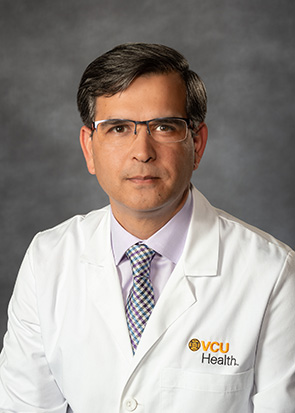
Amit Sharma, MD
SpecialtiesTransplant surgery
Locations
Bio
Around the world for world-class transplant training and quality patient care
Dr. Amit Sharma got his start as a general surgeon at a small community hospital in his home state of Punjab, India.
It was the early 2000s. He and his colleagues would watch helplessly as some patients would die from liver disease because there was no access to transplant care; in a country of 1 billion people, only a tiny handful of liver transplants were performed at that time. "And while kidney transplants were available, their high cost forced many patients in his community to sell their homes to afford the life-saving surgery. What he witnessed moved him to action, and in 2003, he left India to undergo training in Sweden to become a transplant surgeon.
For four years, he trained at the renowned Karolinska Institute, a hub of innovation in transplantation science and the medical university responsible for awarding the Nobel Prize in Physiology or Medicine. His education laid the foundation for his passion for liver, kidney and pancreas transplantation, coupled with a commitment to improving patient outcomes.
Sharma landed at Virginia Commonwealth University in 2007, where he has since become a pivotal figure, well beyond Richmond, in advancing robotic transplant surgeries. He performs living and deceased donor liver and kidney transplants, pancreas transplants, liver resections for hepatocellular cancer and other abdominal surgeries.
VCU Health Hume-Lee Transplant Center is home to a series of groundbreaking firsts, and Sharma has been on the front line of many of them. He performed Virginia’s first robotic liver resection in 2014 and in 2018, he was on the team that performed the first fully robotic kidney transplant at VCU Health. He performed the first ABO (blood)-incompatible kidney transplant in Virginia, and helped restart the living donor liver transplantation program at Hume-Lee.
Today, he continues to pioneer robotic kidney transplants and nephrectomies (removals), significantly improving patient recovery times and reducing complications.
“I want to be looked at as someone who puts patients first, always, number one,” says Sharma. “I hold myself to very high standards, and I like others to keep up with those standards because transplant is such a complex specialty.”
Yet his work doesn’t end at patient care. “I enjoy transplantation, but I also enjoy my research — especially looking at our outcomes,” he says. His interest in research — a critical element in the world of medicine that helps providers worldwide learn best practices, modern techniques and therapies and uncover new innovations — centers on quality outcomes for transplant patients. His goal is to reduce hospital stays, minimize complications and use those advancements to help healthcare affordability and access to care — especially in disadvantaged communities like his home community in India.
“We strive to deliver quality outcomes,” he says, “and that's what drives me.”
Sharma is also a staunch advocate for making transplantation accessible to underserved populations, inspired by early experiences in India where patients struggled with the cost of post-surgical care. (Today, India is one of the top nations for liver transplants, driven by living donation). While he has no plans to leave VCU Health anytime soon, he holds a dream to someday go back to the small community hospital in his home state of Punjab and perform transplants for low-income patients in need.
As a dedicated educator and mentor, Sharma has trained numerous residents and fellows, many of whom have gone on to establish successful transplant programs globally, including in India, where he continues to support efforts to expand access to life-saving surgeries.
“One of our greatest accomplishments is we have been able to train the next generation of transplant surgeons and convince others to join the specialty,” he says. And that includes his own son, in training to become a fourth-generation physician.
“Medicine runs in the family,” he says. “We take great pride in that.”
